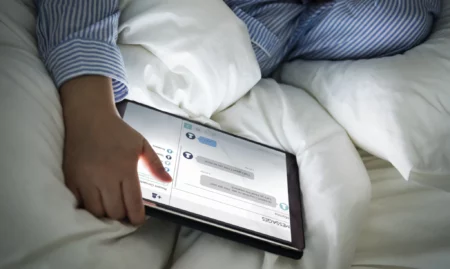 In our digitally connected world, screens have become an integral part of our daily lives. However, the glowing screens of smartphones, tablets, and computers emit a type of blue light that can significantly impact our sleep quality.
In our digitally connected world, screens have become an integral part of our daily lives. However, the glowing screens of smartphones, tablets, and computers emit a type of blue light that can significantly impact our sleep quality.
In the quest for optimal sleep quality, limiting exposure to screens before bed is a simple yet powerful strategy. By understanding the impact of blue light, establishing a digital curfew, and incorporating sleep-friendly alternatives, you can create a bedtime routine that supports a restful night’s sleep.
Prioritize your sleep, and let your nightly routine reflect the importance of giving your body the time it needs to unwind and rejuvenate.
To optimize your sleep routine, consider implementing the following strategies to limit screen exposure before bedtime.
Understanding the Impact of Blue Light
The blue light emitted by electronic devices can interfere with the production of melatonin, the hormone responsible for regulating sleep-wake cycles. Exposure to this light suppresses melatonin production, making it harder for your body to signal that it’s time to wind down and prepare for sleep.
Establishing a Digital Curfew
Set a digital curfew at least an hour before your planned bedtime. This allows your body the time it needs to naturally wind down and transition into a state conducive to restful sleep. Use this time to engage in calming activities that don’t involve screens.
Choosing Sleep-Friendly Alternatives
Rather than scrolling through your phone or watching TV, consider alternative activities that promote relaxation. Reading a physical book, practicing gentle stretches, or enjoying a warm bath are excellent alternatives. These activities can help signal to your body that it’s time to prepare for sleep.
Activating Night Mode on Devices
Many electronic devices now come equipped with a “Night Mode” or “Blue Light Filter” feature. Activate this function in the evening to reduce the amount of blue light emitted by your screen. This subtle adjustment can minimize the impact on melatonin production, facilitating a smoother transition to sleep.
Investing in Blue Light Blocking Glasses
If reducing screen time before bed is challenging, consider investing in blue light-blocking glasses. These glasses are designed to filter out a significant portion of the blue light emitted by screens, allowing you to use electronic devices without disrupting your circadian rhythm.
Creating a Sleep-Inducing Environment
Enhance your sleep environment by minimizing the use of electronic devices in the bedroom. Establish a relaxing atmosphere with dim lighting to signal to your body that it’s time for rest. Reserve your bedroom for sleep and intimate activities, reinforcing the association between the space and relaxation.
Prioritizing Quality Sleep
Recognize the importance of prioritizing quality sleep for overall health and well-being. Consistently limiting screen exposure before bed is a small yet impactful step toward achieving better sleep. Improved sleep quality has far-reaching benefits, including enhanced cognitive function, mood regulation, and overall physical health.
Picture Credit: Freepik
